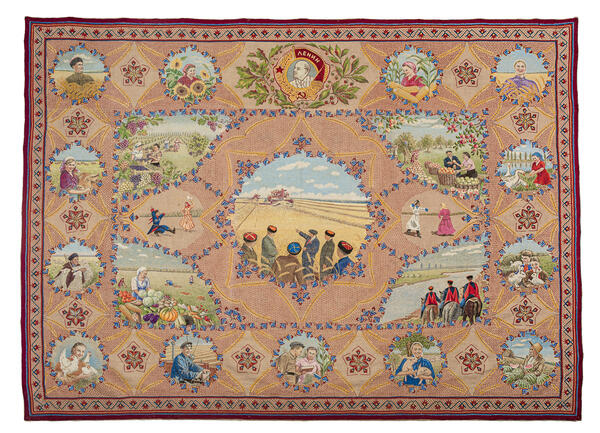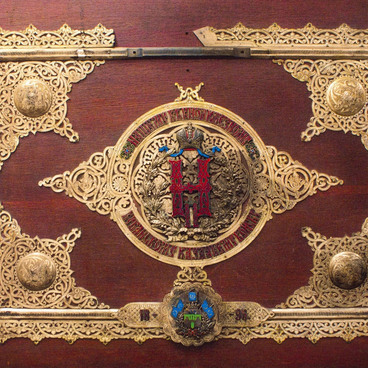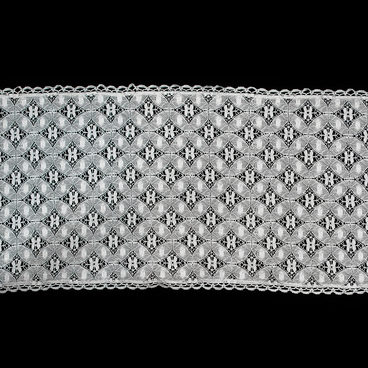On October 31, 1957, the Presidium of the Supreme Soviet of the USSR issued a decree, which stated that Krasnodar Krai was granted the Order of V. I. Lenin ‘for the outstanding success achieved by the working people of the region in increasing the production and procurement of grain, meat, milk, eggs, and other agricultural products’. The Order was given at a ceremony that took place on October 15, 1958, at the Gorky Regional Drama Theater. Nikita Khrushchev, Chairman of the Council of Ministers of the USSR, personally participated in it.
To celebrate this event, a fabric panel ‘Orders Awarded to Kuban’ was made. In the upper part of the cotton frame, there is an image of the Order of Lenin, and along the perimeter, there are medallions of the same round shape, each depicting a scene from the life of collective farmers. One can see poultry women and milkmaids at work, wheat and cornfields, Taman vineyards and fields with watermelons and melons. Each separate scene is decorated with a floral ornament.
There are some larger images in the center. The largest central medallion features the harvest, observed by the Cossacks in traditional Kuban papakhas (tall Caucasian fur hats) with a red top. The space between the images is filled with geometric patterns.
Today, the panel ‘Orders Awarded to Kuban’ is included in the collection ‘Kuban in 1945–1991’. The artisan who created it is unknown, the museum staff are conducting a study that would allow to identify the author. This exhibit was donated to the collection of the Felitsyn Museum by the City Committee of the CPSU in 1958.
In 1957, agriculture in the Kuban region began to develop rapidly. At that time, the agricultural industry was headed by the secretary of the Krasnodar Krai Committee of the CPSU, Dmitry Polyansky. Later, in 1973, he became the Minister of Agriculture of the USSR. It was Polyansky who suggested that Kuban collective farmers compete with the American state of Iowa, which, despite its small area, supplied milk and meat to a tenth of the US population.
Polyansky led the region for only a year, but during this time the harvesting of pig in the Krasnodar Territory has tripled, the production of sheep wool has doubled, and the production of milk increased by one and a half times. About 5,000 Kuban collective farmers received orders and medals, 28 people became Heroes of Socialist Labor.
To celebrate this event, a fabric panel ‘Orders Awarded to Kuban’ was made. In the upper part of the cotton frame, there is an image of the Order of Lenin, and along the perimeter, there are medallions of the same round shape, each depicting a scene from the life of collective farmers. One can see poultry women and milkmaids at work, wheat and cornfields, Taman vineyards and fields with watermelons and melons. Each separate scene is decorated with a floral ornament.
There are some larger images in the center. The largest central medallion features the harvest, observed by the Cossacks in traditional Kuban papakhas (tall Caucasian fur hats) with a red top. The space between the images is filled with geometric patterns.
Today, the panel ‘Orders Awarded to Kuban’ is included in the collection ‘Kuban in 1945–1991’. The artisan who created it is unknown, the museum staff are conducting a study that would allow to identify the author. This exhibit was donated to the collection of the Felitsyn Museum by the City Committee of the CPSU in 1958.
In 1957, agriculture in the Kuban region began to develop rapidly. At that time, the agricultural industry was headed by the secretary of the Krasnodar Krai Committee of the CPSU, Dmitry Polyansky. Later, in 1973, he became the Minister of Agriculture of the USSR. It was Polyansky who suggested that Kuban collective farmers compete with the American state of Iowa, which, despite its small area, supplied milk and meat to a tenth of the US population.
Polyansky led the region for only a year, but during this time the harvesting of pig in the Krasnodar Territory has tripled, the production of sheep wool has doubled, and the production of milk increased by one and a half times. About 5,000 Kuban collective farmers received orders and medals, 28 people became Heroes of Socialist Labor.



